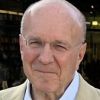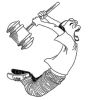19 Space Books That Separate Experts from Amateurs
Curated by Piers Morgan, Simon Winchester, and Walter Isaacson to deepen your Space knowledge





What if the vastness of space wasn't just a backdrop for sci-fi fantasies but a realm where human ingenuity and cosmic mysteries collide every day? Space continues to captivate, challenge, and inspire, not only because of what lies beyond but for what it reveals about our own place in the universe.
Simon Winchester, renowned for chronicling technological triumphs, found himself riveted by the gritty, real-life drama of SpaceX's early days in Liftoff, witnessing the blend of engineering brilliance and human determination. Meanwhile, Piers Morgan, known for his broad cultural insights, praises Limitless for opening a window into the astronaut experience aboard the ISS. Walter Isaacson and Karen Nyberg, a NASA astronaut, also weigh in, highlighting books that blend science, personal stories, and cosmic wonder.
While these expert-curated books provide proven frameworks to grasp the complexities of space, readers seeking content tailored to their specific interests—whether career paths, scientific depth, or exploration themes—might consider creating a personalized Space book that builds on these insights and suits your unique journey.
Recommended by Simon Winchester
New York Times bestselling author
“The elegant brilliance of the engineering that allows today’s space rockets to land themselves back on earth—or at sea—right way up, and on target to the inch, is all the doing of the teams assembled by Elon Musk—and the story of how he did it, and how for sure he will get us to Mars whether we like it or not, is told in appropriately stellar fashion by Eric Berger in a book that held me captive, in earth orbit, from prologue to epilogue, countdown to splashdown.” (from Amazon)
During his years covering space policy and new space ventures for Ars Technica, Eric Berger discovered the untold story of SpaceX's precarious beginnings. This book takes you deep into the nail-biting early attempts to launch the Falcon 1 rocket against daunting odds, revealing the technical challenges and personal sacrifices behind each launch. You’ll gain insight into startup dynamics in aerospace, the interplay between visionaries like Elon Musk and engineering teams, and the fierce competition with legacy aerospace giants. If you're intrigued by how innovation unfolds in high-stakes environments or want a vivid account of the aerospace startup grind, this book lays it out clearly and candidly.
Recommended by Andrew Maynard
Arizona State University professor and futurist
“Kellie Gerardi’s Not Necessarily Rocket Science is a unique and compelling guide to living in this age of space exploration, and one that will appeal to anyone who’s dreams are larger than the limitations others try to wrap them in. Gerardi is informed, inspiring, and full of humanity, as she takes readers on a personal journey into what it means to be a fully signed-up member of the space age. A must-read for space-dreamers everywhere!” (from Amazon)
While working as an aerospace professional and aspiring astronaut, Kellie Gerardi noticed a gap between public perceptions of space and the realities of working in the space industry. In this engaging guide, she shares firsthand experiences from training for Mars missions and testing spacesuits in microgravity, offering insights into the daily challenges and unexpected moments of life in the space age. You’ll learn about the technical demands, physical preparation, and emotional resilience required to pursue a career beyond Earth, making it especially relevant for women and anyone curious about space careers. Chapters like "One-Handed Pushups in Microgravity" provide vivid, memorable examples that ground the narrative in real-world practice.
by TailoredRead AI·
This tailored book explores the vast and dynamic field of space exploration with a focus uniquely aligned to your interests and goals. It covers fundamental principles of rocketry, astronautics, planetary science, and cosmic phenomena, while also examining the latest advances in space missions, technology, and human spaceflight. By weaving together expert knowledge with your specific background, this personalized guide clarifies complex topics and uncovers pathways through the challenges of exploring beyond Earth. Whether you're fascinated by spacecraft design, the search for extraterrestrial life, or the future of human settlement in space, this book offers a focused, engaging learning experience shaped exactly for you.
Recommended by Piers Morgan
English broadcaster and TV personality
“Great to have you, Major - it’s a fantastic book.” (from X)
by Tim Peake··You?
by Tim Peake··You?
What started as a shy boy's fascination with flight evolved into Tim Peake's remarkable journey from British Army officer to astronaut aboard the International Space Station. In this autobiography, Peake pulls you inside his mission with vivid details—from the sensory experiences of space to the emotional weight of command during his 186-day Principia mission. You'll gain insight into astronaut training challenges, including underwater and cave simulations, and the realities of conducting over 250 scientific experiments in orbit. This book suits anyone curious about the human side of space exploration, blending personal memoir with an authentic glimpse of life beyond Earth.
Recommended by John Scalzi
Science fiction author and commentator
“Weird science, explained beautifully.” (from Amazon)
by Katie Mack··You?
by Katie Mack··You?
Katie Mack, a theoretical astrophysicist and assistant professor at North Carolina State University, channels her deep expertise into exploring some of the universe's most profound mysteries. You’ll encounter detailed explanations of five potential cosmic endings—the Big Crunch, Heat Death, Big Rip, Vacuum Decay, and the Bounce—each unpacked with wit and clarity. This book is designed to expand your understanding of cosmology and quantum mechanics, weaving in concepts like string theory without overwhelming you. If you’re fascinated by astrophysics and eager to grasp how the universe’s fate intersects with fundamental physics, this book gives you a thoughtful, engaging guide to those ultimate questions.
by James Trefil··You?
by James Trefil··You?
James Trefil, a physics professor known for translating complex science into accessible language, developed this second edition of Space Atlas to update and expand the visual and scientific mapping of our universe. You’ll explore detailed planetary maps, richly illustrated chapters on the solar system, and sections explaining astrophysical concepts like dark matter and gravitational waves. The book benefits anyone fascinated by space—from casual stargazers to science enthusiasts—by providing clear, authoritative insights paired with stunning National Geographic photography. Notably, astronaut Buzz Aldrin contributes a special section on the moon's critical past and future role in exploration, adding a firsthand perspective.
by TailoredRead AI·
This personalized book explores the fascinating realm of astrophysics with a tailored focus on your specific interests and background. It breaks down complex cosmic concepts into clear, step-by-step actions designed to accelerate your mastery of space science fundamentals. The book covers key astrophysical phenomena, cosmic acceleration, and essential theories, carefully matched to your learning goals and current knowledge level. By synthesizing broad expert knowledge with a customized learning path, it offers an engaging and efficient way to deepen your understanding without wading through unrelated material. This tailored approach ensures you gain meaningful insights and practical comprehension aligned perfectly with your ambitions in space science.
Recommended by The Philadelphia Inquirer
“In prose that revels in the immensity and dispassion of the barely known universe — and bolstered by Lia Halloran’s illustrations of strange celestial shapes and astronauts floating in inky voids — Levin makes space sound like a somewhat reasonable place.” (from Amazon)
by Janna Levin··You?
by Janna Levin··You?
Janna Levin, a professor of physics and astronomy at Barnard College, draws on her rich academic and artistic background to unpack black holes in a way that’s both engaging and accessible. You’ll explore the nature of black holes beyond the usual jargon, gaining insight into their cosmic roles and how they shape the universe, accompanied by evocative artwork that deepens understanding without overwhelming. Chapters invite you to imagine encounters with these enigmatic phenomena, making complex astrophysics approachable whether you’re new to the subject or simply curious. This book suits anyone intrigued by space’s mysteries but daunted by technical texts, offering a vivid, thoughtful journey rather than a textbook.
Recommended by Brian Greene
Professor of Physics and Mathematics, Columbia University
“Massimino's incredible journeys, filled with grit, courage, suspense and thrills, are told with such candor and delight, that for a brief moment I felt I’d finally made it to space too. Read this book and be inspired to reach for the impossible.” (from Amazon)
by Mike Massimino··You?
Drawing from his extensive experience as a NASA astronaut and engineer, Mike Massimino offers a vivid insider’s account of life beyond Earth, blending technical insight with personal narrative. You get an intimate look at the challenges of spacewalks, the pressure of repairing the Hubble Telescope, and the grit needed to overcome setbacks like repeated NASA rejections. Chapters detailing the Columbia shuttle tragedy and the Hubble missions reveal not just the science, but the emotional stakes of space exploration. This book suits anyone fascinated by astronautics or the human side of space missions, though it leans toward readers ready for a candid, detailed journey rather than a simple overview.
Recommended by Chris Addison
Ex-spy and commentator
“Michael Collins, pilot of the Columbia, the Apollo 11 Command Module, has died. A great man. His book Carrying The Fire is such a great read - so well written. This print of the picture he took from Columbia, signed by him, hangs proudly on my wall. Vale, as they say.” (from X)
by Michael Collins··You?
by Michael Collins··You?
Michael Collins' decades as an astronaut and test pilot culminate in this detailed memoir that goes beyond the usual spaceflight narrative. You get an intimate view of his journey from Air Force flights to piloting the Apollo 11 Command Module, with vivid reflections on the unique perspective of seeing Earth from lunar orbit. The book offers insights into the technical challenges, psychological solitude, and awe of space exploration, especially in chapters recounting the Apollo 11 mission and his earlier test flights. If you're fascinated by human spaceflight or the personal side of historic missions, this book provides an unvarnished, thoughtful perspective that balances wonder with grounded reality.
Recommended by Christie Aschwanden
New York Times Bestselling Author
“Hilarious, highly informative and cheeky book . . . use[s] humor and science to douse techno dreams with a dose of reality . . . Even as they shoot down a long list of space fantasies, they explore a lot of really interesting research.” (from Amazon)
by Kelly Weinersmith, Zach Weinersmith··You?
by Kelly Weinersmith, Zach Weinersmith··You?
After years of digging into the science and ethics of space settlement, Kelly and Zach Weinersmith developed a candid look at the reality of becoming a multiplanetary species. You’ll learn about the biological, political, and social challenges of living off Earth—from the feasibility of space farming to the legal questions surrounding governance and even space cannibalism. The book’s mix of humor and thorough research helps you weigh whether space colonization is a dream worth chasing or a distraction from pressing Earthly issues. If you want to explore the practical and ethical dimensions of space settlement beyond the hype, this book will give you plenty to consider.
Recommended by Publisher's Weekly
“Sutter’s tone is suffused with enthusiasm for his topic and with disarming humor. Funny and informative, Sutter’s gleefully bleak interstellar survey will foster a greater appreciation for humanity’s home, and a deeper understanding of space.” (from Amazon)
by Paul M. Sutter··You?
by Paul M. Sutter··You?
When astrophysicist Paul M. Sutter decided to write this book, he aimed to reveal the universe's deadliest phenomena with clarity and wit. You’ll learn how cosmic events—from black holes to dying stars—pose real dangers, illuminated through vivid metaphors and straightforward explanations. Chapters explore topics like the physics behind supernovae and the hazards of wormholes, giving you both the science and the storytelling to grasp these cosmic threats. If you’re curious about the universe’s darker side and want to deepen your understanding of astrophysical risks, this book speaks directly to your fascination without glossing over harsh realities.
Recommended by Sean Carroll
Physicist at Caltech, science communicator
“It's good to be skeptical of audacious ideas. But it's also important to be open to audacious possibilities, and to think through their ramifications. Avi Loeb's sumptuously written book will provoke you to think about the possibility of intelligent life elsewhere in the universe in new and stimulating ways.” (from Amazon)
The breakthrough moment came when Avi Loeb, Harvard's leading astronomer, proposed that an unusual object passing through our solar system in 2017 was not an asteroid but advanced alien technology. In this book, you’ll explore the scientific evidence behind this claim, including the object's high speed, unusual trajectory, and lack of debris, alongside the broader implications for science and society. Loeb’s narrative intertwines his personal reflections with a challenge to conventional scientific assumptions, inviting you to reconsider humanity’s place in the cosmos. This book suits anyone curious about astrophysics, the search for extraterrestrial intelligence, or the philosophical questions sparked by such discoveries.
Recommended by The New Scientist
“Riveting questions fielded by three top astrophysicists in engaging style, with great illustrations and just a handful of equations. They may just have produced the best book about the universe in the universe.” (from Amazon)
by Neil deGrasse Tyson, Michael A. Strauss, J. Richard Gott··You?
by Neil deGrasse Tyson, Michael A. Strauss, J. Richard Gott··You?
Drawing from their extensive experience as leading astrophysicists, Neil deGrasse Tyson, Michael A. Strauss, and J. Richard Gott guide you through the vast cosmos with clarity and wit. You’ll explore everything from the lifecycle of stars and the mysteries of black holes to the expansion of the universe and the prospects of intelligent life beyond Earth. The book’s conversational tone and vivid illustrations bring complex astrophysical concepts within reach, particularly in chapters explaining phenomena like wormholes and dark energy. If you’re curious about how we know what we know about space and want a tour that balances depth with accessibility, this book offers a thorough introduction without overwhelming jargon.
Recommended by Goodreads
“Engaging and illuminating.” (from Amazon)
by Neil deGrasse Tyson··You?
by Neil deGrasse Tyson··You?
Neil deGrasse Tyson's decades of astrophysics research and public science advocacy led him to write this book as a way to distill complex cosmic concepts into digestible insights for busy minds. You’ll learn foundational ideas about space and time, from the Big Bang and quantum mechanics to black holes and the search for extraterrestrial life, all explained with Tyson’s characteristic wit and clarity. The chapters are short, making it easy to absorb key ideas during brief moments of downtime. If you've ever wanted to grasp the universe’s basics without getting bogged down in jargon, this book gives you just that, making it a solid choice for curious minds rather than specialists.
Recommended by Brian May
Rocket Ship Builder
“I love this book. It represents a new giant leap in our ability to visualize the universe. For me, reading it was a shocking realization that I must now update my mental picture of the cosmos.” (from Amazon)
by David J. Eicher··You?
by David J. Eicher··You?
When David J. Eicher, editor in chief of Astronomy magazine, compiled this extensive exploration of galaxies, he drew on decades of experience communicating complex astronomy topics to the public. You gain a vivid understanding of different galaxy types, their formation, and cosmic phenomena like black holes powering star cities. The book’s rich illustrations and rare archival photographs, especially in chapters detailing galaxy classification and cosmic evolution, deepen your grasp of the universe’s structure. This book suits anyone intrigued by cosmic scale and the intricate workings behind our galactic neighbors, providing both historical context and up-to-date discoveries without overwhelming jargon.
Recommended by Roger Penrose
Author of new physics and universe books
“Laura Mersini-Houghton’s Before the Big Bang provides a fascinating account of the background and underlying motives for her intriguing proposal for the physical principles that may have governed the explosive origin of our universe.” (from Amazon)
by Laura Mersini-Houghton··You?
by Laura Mersini-Houghton··You?
Drawing from her extensive background as a leading cosmologist and theoretical physicist, Laura Mersini-Houghton challenges conventional ideas about the universe's origins. She guides you through the concept of the multiverse, revealing how recent scientific tools have begun to uncover evidence of other universes beyond our own. The book delves into quantum landscapes and cosmic signatures, offering insights into the fundamental forces shaping existence itself. You’ll gain a deeper understanding of what might have preceded the Big Bang and the implications of a universe that is part of a vast cosmic family. This book suits those curious about foundational cosmology and the evolving frontiers of space science.
Recommended by Sean Carroll
Physicist at Caltech and Santa Fe Institute
“Overthrowing all of modern cosmology isn’t easy, but it could happen. Maybe you will be the one to do it! If you’re up for the challenge, Luke A. Barnes and Geraint F. Lewis tell you exactly what you have to accomplish. Even if you don’t topple the stodgy edifice of modern science, you’ll certainly learn some exciting things about the universe along the way.” (from Amazon)
by Luke A. Barnes, Geraint F. Lewis··You?
by Luke A. Barnes, Geraint F. Lewis··You?
Drawing from their academic backgrounds in astrophysics and cosmology, Luke A. Barnes and Geraint F. Lewis challenge the prevailing Big Bang paradigm by closely examining the observational foundations behind it. You’ll explore key cosmological concepts such as dark matter, black holes, and cosmic evolution, gaining clarity on why certain ideas dominate scientific discourse despite imperfections. Chapters dissect the evidence and theories that shape modern cosmology, arming you with the knowledge to critically assess mainstream views. This book suits anyone curious about the universe’s workings and those ready to question established cosmic narratives.
Recommended by Sean Carroll
Physicist at Caltech and Santa Fe Institute
“What a journey, from the very birth of the universe to its ultimate future. In accessible fashion, Hooper's book does a great job explaining the fundamental laws of physics and showing how they play out in cosmic evolution.” (from Amazon)
Dan Hooper's decades of experience as a senior scientist at Fermilab and professor at the University of Chicago led to this exploration of the universe's earliest moments. You gain insights into the Big Bang's first seconds, including how experiments like the Large Hadron Collider help recreate those conditions and probe the origins of dark matter and cosmic inflation. Chapters cover the transition from cosmic inflation to matter formation, illustrating complex physics with clarity. If you're fascinated by how fundamental particles shaped everything around us, this book offers a focused dive into those initial cosmic events.
Recommended by Sean Carroll
Physicist at Caltech and SFI, science communicator
“Modern cosmology tackles some of the biggest questions we have about the nature of the cosmos. In The 4% Universe, Richard Panek brings this quest down to a human scale.” (from Amazon)
by Richard Panek··You?
Richard Panek, a Guggenheim Fellow and seasoned science writer, unravels the profound mystery of how just 4 percent of the universe is made of known matter, while the rest remains elusive dark matter and dark energy. You gain insight into the scientific process behind this revelation through vivid portraits of key figures like Saul Perlmutter and Vera Rubin, and learn about the experiments and debates that reshaped cosmology. The book offers a narrative that is both a history of discovery and an exploration of current scientific puzzles, making it particularly valuable if you're curious about the forces shaping our cosmos beyond what textbooks cover. While it may challenge your assumptions, it’s ideal for readers ready to grapple with the complexities and uncertainties of modern space science.
Recommended by The Wall Street Journal
“A reminder that the finest telescope in space might also be the greatest camera ever created.” (from Amazon)
by Terence Dickinson··You?
by Terence Dickinson··You?
Terence Dickinson, celebrated for making astronomy accessible, brings you a vivid journey through the cosmos with Hubble's Universe. Drawing on his extensive background as cofounder of SkyNews and author of 14 astronomy books, Dickinson curates nearly 300 stunning images captured by the Hubble Space Telescope, paired with insightful commentary that reveals lesser-known details about these celestial phenomena. You’ll gain a clearer understanding of the forces shaping galaxies, nebulae, and star clusters, enhanced by Dickinson’s direct access to Hubble scientists. This book suits anyone fascinated by space imagery who wants to deepen their grasp of the universe’s grand structures without wading through jargon.
Get Your Personal Space Strategy in 10 Minutes ✨
Stop following generic space advice. Get targeted insights without reading 20+ books.
Trusted by 67 space enthusiasts and experts worldwide
Conclusion
The collection of these 19 books paints a diverse picture of space—from the gritty realities of pioneering startups to the profound mysteries of cosmic beginnings. If you're grappling with where to start, Astrophysics for People in a Hurry offers an accessible entry point, while Liftoff and Spaceman deliver gripping human stories for those drawn to the personal side of exploration.
For rapid insight into cosmic phenomena, pairing The End of Everything with How to Die in Space can quickly deepen your understanding of the universe's dark corners. Meanwhile, A City on Mars challenges you to think critically about the future of human settlement beyond Earth.
Alternatively, you can create a personalized Space book to bridge the gap between general principles and your specific situation. These books can help you accelerate your learning journey and connect with the cosmos on your own terms.
Frequently Asked Questions
I'm overwhelmed by choice – which book should I start with?
Start with Astrophysics for People in a Hurry by Neil deGrasse Tyson. Its concise chapters offer a swift, clear overview of key cosmic concepts, easing you into the vastness of space without feeling lost.
Are these books too advanced for someone new to Space?
Not at all. Titles like Not Necessarily Rocket Science and Black Hole Survival Guide are written to be accessible and engaging, perfect for newcomers curious about space careers and phenomena.
Should I start with the newest book or a classic?
It depends on your interest. Newer books like A City on Mars explore current debates on space settlement, while classics like Carrying the Fire provide timeless astronaut perspectives. Both offer valuable insights.
Do I really need to read all of these, or can I just pick one?
You can definitely pick one or two that align with your interests. For example, Liftoff if you're fascinated by aerospace startups, or The End of Everything if cosmology intrigues you.
Which books focus more on theory vs. practical application?
The Cosmic Revolutionary's Handbook and Before The Big Bang delve into theoretical cosmology, while Spaceman and Carrying the Fire provide practical, hands-on astronaut experiences.
How can I get space knowledge tailored to my goals without reading multiple books?
While these books offer great foundational knowledge, you can create a personalized Space book that blends expert insights with your specific interests and background, saving time and focusing on what matters most to you.
📚 Love this book list?
Help fellow book lovers discover great books, share this curated list with others!
Related Articles You May Like
Explore more curated book recommendations


















